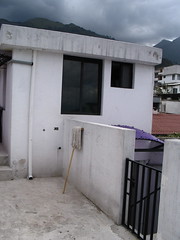Snippet 2
I walked with Will, Angie and Eileen to a mall known as CCI sometime just after noon. Nearby is the Supreme Court and we were hoping we’d be able to see some demonstrations in front of the court. I knew the area, so I knew we’d have wide expanses of sidewalks, parks, and boulevards in which to position ourselves a safe distance away. As we approached, however, all the signs pointed to a disappointing lack of action. There were no crowds of people, no riot tanks parked on corners, no clouds of tear gas floating on the wind.
So we went to lunch in the Mariscal (gringo land) and then walked toward La Patria Avenue hoping to see at least some crowds. We weren’t disappointed this time. When we got to La Patria, the street was shut down and there were various groups sparsely populating the empty road. We walked one block up La Patria and were soon faced with a crowd of people running toward us, so we turned quickly onto Amazonas and saw five tear gas bombs come flying through the air at the crowds on La Patria. Eileen kept her distance, as did Will, but I stayed close to La Patria with Angie until it became apparent that we really shouldn’t be standing there anymore. By then, the police had launched a canister of tear gas onto Amazonas. We ran away from La Patria through a cloud of it. I think all four of us got it pretty bad.
We walked briskly up Amazonas (nobody was running, and we figured the police would mostly stay on LaPatria), and as we approached the first block north of La Patria, some shouts warned us of an incoming tear gas bomb. We all covered our heads; the canister landed ahead of us; and one of the protesters picked it up and threw it over a building. At this point, I spotted a group of police standing in front of a court on the street intersecting Amazonas. Four of my former students were among the group, dressed in their gray, urban camaflauge. I approached them and talked for a while about whether or not they’d be allowed to return to English classes.
Just then, a bus arrived, wanting to get through the crowd gathered on Amazonas, but they weren’t too eager to allow them. I heard several very strong insults being thrown at the bus driver: “verga,” “chucha” “putamadre.” At this point, my police had to walk out to Amazonas to clear the path for the bus. Most people fled just upon seeing the police approach. We hung out for a minute or so until I could properly say goodbye to my former students. I introduced them to Eileen, Angie and Will, explaining at one point that Will really wanted to learn Spanish. Cesar, one of my best students from the police days, said, “first lesson: ‘fuera Lucio’”

